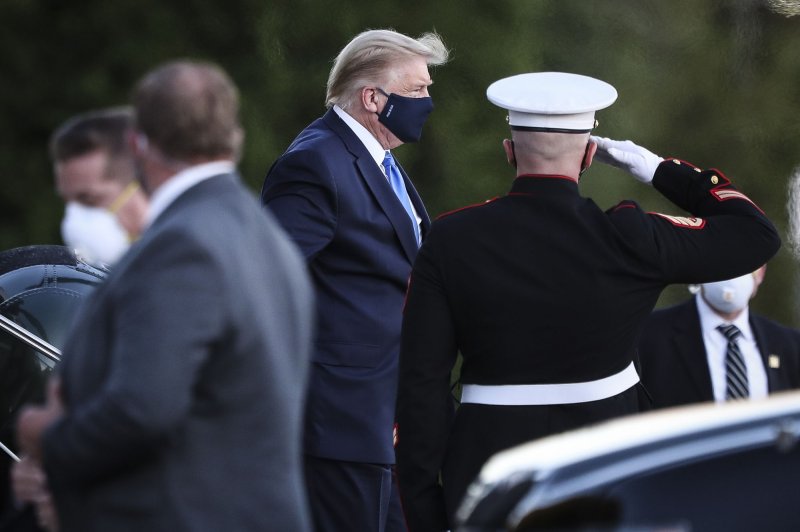U.S. President Donald Trump exits Marine One after arriving at Walter Reed National Military Medical Center in Bethesda, Md., on Friday. Photo by Oliver Contreras/UPI |
License Photo
Oct. 2 (UPI) -- With President Donald Trump hospitalized with COVID-19 Friday, questions turn to what happens if he loses the ability to govern.
Marine One transported the president to Walter Reed Army Medical Center in Bethesda, Md., less than one day after his diagnosis, indicating perhaps a more serious downturn to his health.
White House press secretary Kayleigh McEnany issued a statement saying he had "mild symptoms," but sources told The New York Times and CNN that Trump has had a fever, congestion and a cough.
He's expected to stay at the military hospital for "a few days," the White House said.
The vast majority of people with the novel coronavirus are asymptomatic or experience mild symptoms, but what happens if Trump becomes too sick to carry out his duties as leader of the United States?
According to the Constitution, if the president becomes incapacitated, the 25th Amendment is invoked, transferring the the power of the office to the vice president temporarily.
The 25th Amendment was ratified in 1967 after the assassination of President John F. Kennedy, laying out the terms of succession should the leader of the country become ill, resign, be removed from office or even die. There are provisions in the amendment that lay out what happens if the president chooses to transfer power and what happens if that transfer needs to be done involuntarily.
Former Presidents Ronald Reagan and George W. Bush each invoked the amendment during their presidencies -- Bush did so twice -- temporarily transferring power to their vice presidents during medical procedures in which they were under general anesthesia. Both had the ability to make those decisions for themselves, and did so in writing to Congress.
Should the president be incapacitated and unable to make that decision, though, the vice president, Mike Pence, and a majority of Cabinet members must alert Congress in writing and install the vice president as acting president.
If the president is able to dispute the invocation of the 25th Amendment, again, the vice president and a majority of the Cabinet must inform Congress in writing that the president is unable to perform his duties within four days. Congress must then pass a two-thirds vote to remove the president from office.
Pence and his wife, second lady Karen Pence, have each tested negative for the virus.
Should the vice president also become incapacitated, though, the Presidential Succession Act defines the order of succession as: Speaker of the House Nancy Pelosi, President Pro Tempore of the Senate Chuck Grassley, Secretary of State Mike Pompeo, Treasury Secretary Steven Mnuchin, Defense Secretary Mark Esper, Attorney General William Barr, Interior Secretary David Bernhardt, Agriculture Secretary Sonny Perdue, Commerce Secretary Wilbur Ross, Labor Secretary Eugene Scalia, Health and Human Services Secretary Alex Azar, Housing and Urban Development Secretary Ben Carson, Energy Secretary Dan Brouillette, Education Secretary Betsy DeVos, Veterans Affairs Secretary Robert Wilkie, then Homeland Security Secretary Chad Wolf.
Transportation Secretary Elaine Chao is ineligible to become president because she's not a natural-born citizen.
Mannequins with face masks and designer clothing fill a window at a Diane Von Furstenberg store in New York City on September 8, 2020. Photo by John Angelillo/UPI |
License Photo
















